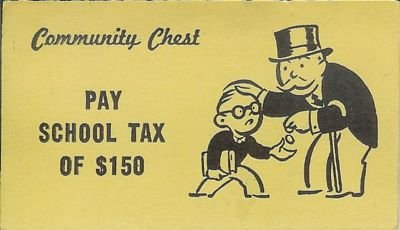Will Education become a Monopoly Game?

Lately, I have been talking with a couple of start-ups in education that take on the classroom experience. The common problem those developers have is that there are at least three different platforms they need to develop their application for, iOS, Android (with all the different sub-versions) and Windows Mobile 7.
Of course, the easiest solution would be to create web applications based on HTML 5 but for the moment the experience on those devices is usually better served by a native application.
And this is what may lead us sooner or later to a big problem. In order to make the concept of the digital backpack come true for all students, schools and parents needed to decide for one of those platforms and for the moment it is rather obvious that Apple and its iPad / iPod / iPhone trio is still leading in both technology and adoption from users.
Taking this a step further, Apple’s current status would result into them having a de facto monopoly, and the same was true for the companies which create the apps for public and higher education. This also means that education itself would risk to become just another market to exploit as companies are predominantly driven by their monetary interest.
Now, you might say that this is a bit far-off but remember what happened with Microsoft in the nineties. Its products Windows and MS Office basically ran on every computer. From the ones at home to those in companies and administration. One might say the tipping point were the anti-trust investigations over Microsoft in Europe and the US that made governments around the globe decide to switch to viable alternatives such as open source software like Linux and Open Office. Other obstacles due to mass adoption such as security problems caused by malware, viruses and hacker attacks enforced this process, a similar trend can now be seen with Apple and Android devices.
And what about web search? Isn’t Google about to face anti-trust investigations because of its dominance in search and the closely tied online advertisement?
In the beginning, most consumers don’t care about the side effects as the benefits outweigh the risks. When everyone is using the same OS and software the IT guys don’t need to bother converting them into other formats etc. and if a web service offers me so many services for free I might as well share some personal information with it to make the experience even better.
Looking at it from the education angle, the same as described above is of course somewhat true for budget stretched schools and colleges. Isn’t it far better to invest into a platform that offers the best applications, is cross-compatible to different popular devices and on the cutting edge of technology? Parents don’t need to bother to invest in dedicated devices, we just saw the idea of the Kno fail. And what did Kno pivot into? An application for the most popular tablet, the iPad.
And this leads me to the question who is going to have the monopoly on education in the future and how it may look like. Should the state take more control over the decisions which devices and software / applications get credited like in the publishing space? Should publishers that already have the long term expertise in developing textbooks and other education-related material work together more closely with hardware manufacturers? Should there be a dedicated device similar to the long awaited $35 tablet in India for the education space?





